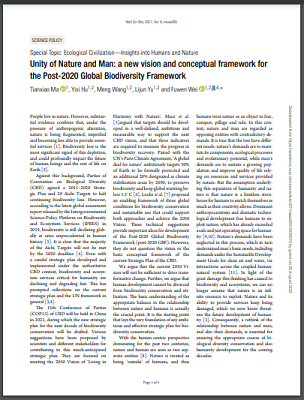
People live in nature. However, substantial evidence confirms that, under the pressure of anthropogenic alteration, nature is being fragmented, imperiled and becoming less able to provide essential services. Biodiversity loss is the most significant signal of this depletion, and could profoundly impact the future of human beings and the rest of life on Earth. Against this background, Parties of Convention on Biological Diversity (CBD) agreed a 2011–2020 Strategic Plan and 20 Aichi Targets to halt continuing biodiversity loss. However, according to the latest global assessment report released by the Intergovernmental Science-Policy Platform on Biodiversity and Ecosystem Services (IPBES) in 2019, biodiversity is still declining globally at rates unprecedented in human history . It is clear that the majority of the Aichi Targets will not be met by the 2020 deadline. Even with a careful strategic plan developed and implemented under the authoritative CBD context, biodiversity and ecosystem services critical for humanity are declining and degrading fast. This has prompted reflections on the current strategic plan and the UN framework in general.














